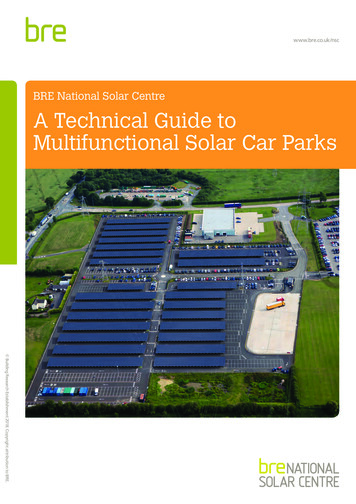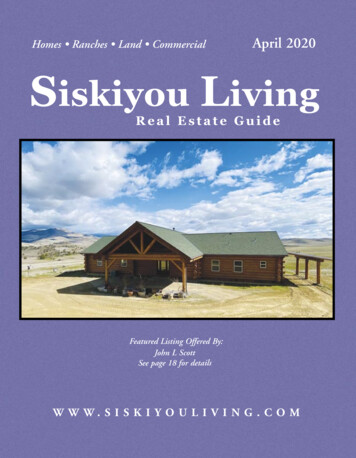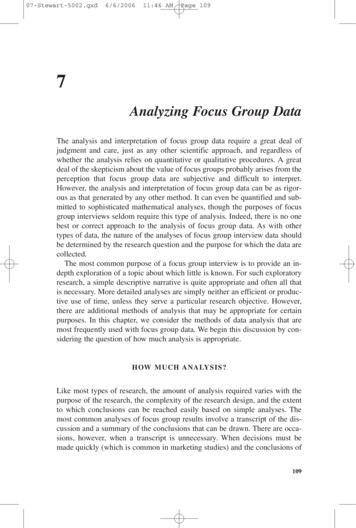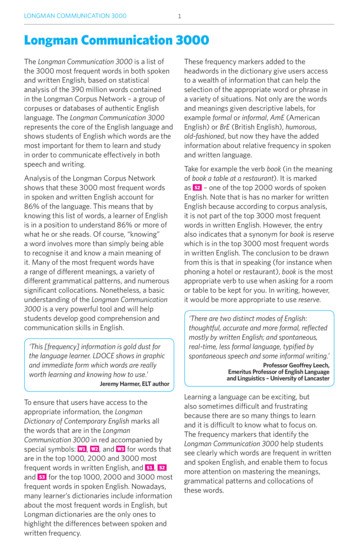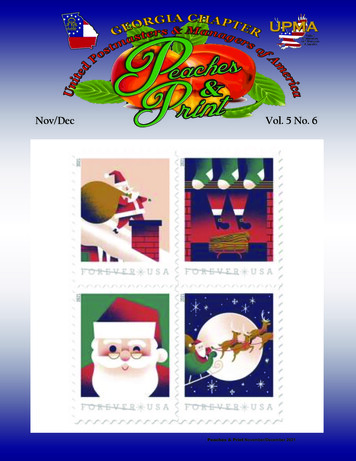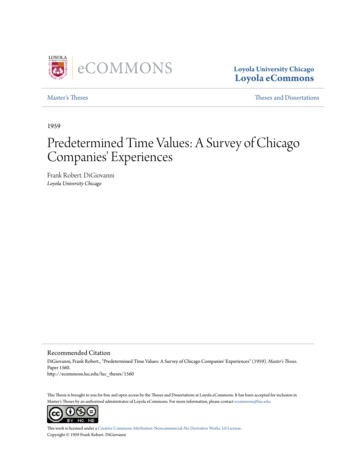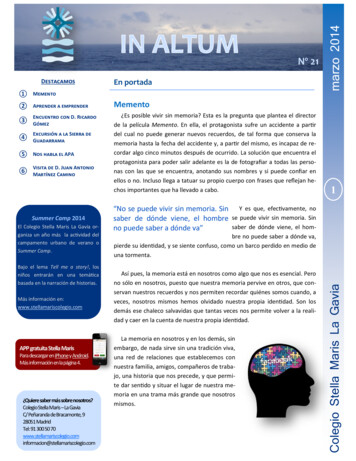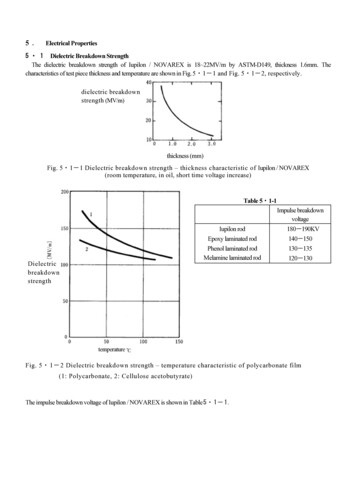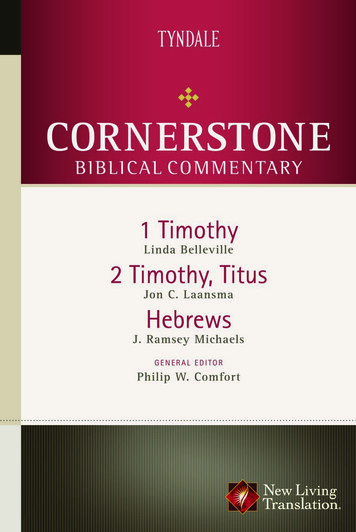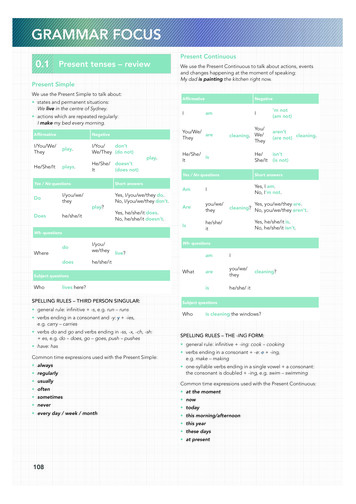
Transcription
GRAMMAR FOCUSPresent Continuous0.1Present tenses – reviewPresent SimpleWe use the Present Simple to talk about:Affirmative states and permanent situations:We live in the centre of Sydney.I actions which are repeated regularly:I make my bed every ey (do not)play.He/She/Itplays.He/She/ doesn’tIt(does not)Yes / No questionsDoI/you/we/theyShort answersAmIYes, I am.No, I’m not.Areyou/we/theyIshe/she/itYes, you/we/they are.cleaning? No, you/we/they aren’t.Yes, he/she/it is.No, he/she/it isn’t.Wh- questionslive?amIareyou/we/theyishe/she/ ithe/she/itSubject questionsWhoaren’t(are not) cleaning.Yes / No questionsWh- questionsdoesYou/cleaning. We/They’m not(am not)He/isn’tShe/It (is not)Yes, he/she/it does.No, he/she/it doesn’t.he/she/itWhereIHe/She/isItYes, I/you/we/they do.No, I/you/we/they don’t.I/you/we/theydoamShort .We use the Present Continuous to talk about actions, eventsand changes happening at the moment of speaking:My dad is painting the kitchen right now.Whatlives here?SPELLING RULES – THIRD PERSON SINGULAR: general rule: infinitive -s, e.g. run – runs verbs ending in a consonant and -y: y -ies,e.g. carry – carriescleaning?Subject questionsWhois cleaning the windows? verbs do and go and verbs ending in -ss, -x, -ch, -sh: es, e.g. do – does, go – goes, push – pushesSPELLING RULES – THE -ING FORM: have: has general rule: infinitive -ing: cook – cookingCommon time expressions used with the Present Simple: verbs ending in a consonant -e: e -ing,e.g. make – making always regularly usually often sometimes never every day / week / month one-syllable verbs ending in a single vowel a consonant:the consonant is doubled -ing, e.g. swim – swimmingCommon time expressions used with the Present Continuous: at the moment now today this morning/afternoon this year these days at present108Z01 FOCUS SB 03GLB 8099 GF.indd 10806/07/2015 18:17
Present PerfectIrregular verbsWe use the Present Perfect to talk about actions and eventswhich:Many verbs have an irregular past participle form (e.g. write,go, lose). A list of irregular verbs can be found in the WORDSTORE on page 25. finished in the past, but we don’t know or it’s not importantexactly when they happened:My friends have seen my new house. started in the past and continue up to now:We’ve had this TV for three years.When describing actions which started in the past andcontinue into the present, we often use since and for: since describes when the action or state began:since 2012/Sunday/last month/my birthday/I moved here for describes how long the action or state has continued:for five minutes/a week/a long time/ages/most of my shed.He/She/ItYes / No questionsHavefinished.hasn’t(has not)doesn’t workhasn’t workedisn’t working1 Monicatoday. She’s sick.2 Fredon Fridays. He’s in the office from Mondayto Thursday.3 Johnfor a long time. He can’t find a job.have been tohave gone to4 My parents aren’t at home – theythat new Italianrestaurant.5 Wethat new Italian restaurant twice – we reallylike it.6 Theremany changes to my town over the years.Short answersYes, I/you/we/they have.No, I/you/we/they haven’t.I/you/we/theyhe/she/itYes, he/she/it has.No, he/she/it hasn’t.are you doingdo you dohave you done7 Whyyour homework now? It’s Friday evening.8 How oftenexperiments in your Chemistry class?9 Whatto my dress? It looks awful now!2 Complete the sentences with the correct present formWh- questionsof the verbs in ubject questionsWho1 Complete the sentences with the verbs in the boxes.have beenfinished?HasPay attention to how we use the forms been and gone:Monica has been to the USA. (Sometime in the past, she is notthere now).Monica has gone to the USA. (She is there right now).has studied French before?SPELLING RULES – PAST PARTICIPLE FORMRegular verbs1 Lucy’s family(not come) from the USA – they’reEnglish.2 How long(you/live) in the countryside?3 My brother has gone to Austria for a few days. I’m surehe(ski) now.4 How often(your older brother/usually/visit) yourparents?5 I(have) this armchair for ages. It’s old butcomfortable.6 Gillian(wear) a big cap and a long scarf becauseit’s cold today. general rule: infinitive -ed, e.g. work – worked verbs ending in -e: -d, e.g. like – liked verbs ending in a consonant -y: y -ied, e.g. cry – cried one-syllable verbs ending in a single vowel consonant*:the consonant is doubled -ed, e.g. stop – stopped*except -x and -w, e.g. boxed, flowed two-syllable verbs ending in a vowel consonant: theconsonant is doubled when the stress is on the secondsyllable, e.g. refer – referred travel: although the stress is on the first syllable, -l isdoubled, e.g. travel – travelled109Z01 FOCUS SB 03GLB 8099 GF.indd 10906/07/2015 18:17
GRAMMAR FOCUS1 Choose the correct options.0.2 QuantifiersNouns can be countable or uncountable.Countable nouns: have both singular and plural forms:This apple is very sweet.These apples are very sweet. can be used with a/an/the or a number:an egg, the egg, the eggs, two eggs1 How many / How much butter do I have to buy?2 You’ve written a great essay. There are much / lots ofgood ideas.3 My grandparents live on a farm and have some / a littlechickens.4 I can give you a few / a little tips if you need my help.5 How many / much time do you need to clean the flat?6 I have to get another job. At the end of the month I’vegot very little / a little money left.2 Complete the sentences with quantifiers. SometimesUncountable nounsmore than one answer is possible. have no plural form:Milk is very healthy.123456 can be used with the, but not with a/an or a number:water, the water a water, one waterWe often use the following quantifiers with countable anduncountable nouns:Countable nounsUncountable nounshow many?How many eggs are there?how much?How much sugar is there?manyAre there many eggs?We haven’t got many eggs.muchIs there much sugar?We haven’t got much sugar.people find it difficult to eat healthily.I’m sure there waschicken in the freezer.Have you gotfriends in London?days off school do we get for Christmas?There aren’tcakes left – we’ve sold everything.I’ve readreviews for that new sushi restaurant inHigh Street.a lot of/lots ofThere are a lot of/lots ofeggs in the fridge.There is a lot of/lots ofsugar in the cupboard.a fewI need a few eggs.a littleI need a little sugar.someThere are some eggs in thefridge.There is some sugar in thecupboard.fewThere are few eggs in thefridge.littleThere is little sugarin the cupboard.any (?)Is there any sugar in thecupboard?Are there any eggs in thefridge?any (–)There aren’t any eggs in thefridge.There isn’t any sugar in thecupboard.110Z01 FOCUS SB 03GLB 8099 GF.indd 11006/07/2015 18:17
SPELLING RULES – PAST SIMPLE FORMPerfect and0.3 PresentPast SimpleRegular verbsPresent PerfectWe use the Present Perfect to talk about actions and eventswhich finished in the past, but we don’t know when or it’s notimportant when exactly they happened:My dad has been to many concerts.Common time expressions used with the Present Perfect:The rules for forming the Past Simple form of regular verbs arethe same as those for the past participle form of regular verbs.(See section 0.1 on page 109.)Irregular verbsMany verbs have an irregular Past Simple form (e.g. write, go,lose). There is a list of irregular verbs in the WORD STORE onpage 25. ever – used in questions:Have you ever danced in a shopping centre?Common time expressions used with the Past Simple: never – used in negative sentences:My grandparents have never watched a film online. last already and just – used in affirmative sentences, betweenhave and the past participle form of the main verb:I have already read this book. They have just arrived. when yesterday yet – used in negative sentences or questions, at the end ofthe sentence:She hasn't called yet. Has she called yet? ago in the past then1 Use the prompts to write two Present Perfectsentences for each question: an affirmative one withalready anda negative one with yet.Past SimpleWe use the Past Simple to talk about actions and eventswhich started and finished in the past. We often say when theyhappened:My dad went to a concert eydanced.Yes / No questionsDid123456I/You/He/didn’tShe/It/(did not)We/Theydance.2 Complete the conversations with the Present Perfect orPast Simple form of the verbs in brackets.1 A:(you/buy) a new dress for the party yet?B: No, not yet. But I(go) shopping last weekendand I(see) two really nice dresses.2 A: When(Lea/start) writing her fashion blog?B: Three months ago, I think. She talks a lot about it, butI(not read) it yet!3 A:(you/ever/hear) about Scarlett Thompson?B: Oh yes, she’s a British novelist. My sister(read)all her books when she(be) in hospital.4 A: I(just/cook) some pasta. Would you like some?B: No, thank you. We(have) a three-course dinnerjust an hour ago.Short answersI/you/Yes, I/you/he/she/it/we/theyhe/she/did.dance?it/we/No, I/you/he/she/it/we/theytheydidn’t.Wh- questionsWheredidI/you/he/she/it/we/they dance?Subject questionsWhodancedin the shopping centre?I / see / a flashmobSam / buy / a new jacketwe / shop onlineyou / have / a swimming lessonFiona and Frank / open / an online storeSally / post / a video / on YouTube3Complete the sentences with the Present Perfect orPast Simple form of the verbs in brackets.123456I(learn) to play the guitar three years ago.(you/buy) a new suit yet?Rob(have) his first driving lesson yesterday.When(Helen/write) this song?(Mark/ever/visit ) Chicago before?Tom(not open) a bank account yet.111Z01 FOCUS SB 03GLB 8099 GF.indd 11106/07/2015 18:17
GRAMMAR FOCUSand superlative0.4 Comparativeadjectives – too and enough We use the comparative form of adjectives and the wordthan when we want to compare two people or things:This shirt is cheaper than the sweater. We use the superlative form of adjectives to show that aperson or thing has the highest degree of a certain quality(compared to at least two other people or things):This is the most expensive ring in the shop. To compare two people or things, we can also use (not) as adjective as:This jacket is not as comfortable as that oungernicerhotterthe youngestthe nicestthe hottesttwo-syllableadjectivesending in -yprettydryprettierdrierthe prettiestthe driesttwo-syllableor longeradjectivesexpensive moreexpensivedangerous moredangerousthe mostexpensivethe mostdangerousirregularadjectivesgoodbadfarthe bestthe worstthe furthestone-syllableadjectivesbetterworsefurtherWe often use too ( more than you need or want) and notenough ( less than you need or want) with adjectives. Thepatterns are: too adjective and not adjective enough:The designer was too busy to talk to the press.The horse wasn’t fast enough to win the race.1 Complete the sentences with one word in each gap.1 Are womencareful with money than men?2 I’m bad at football, but I’m evenat tennis.3 Black skinny jeans are thefashionable trousersthis season.4 Shopping with friends is bettershopping alone.5 This isbiggest shopping centre in our town.6 Denim jackets are as popularleather jackets thisseason.2 Complete the sentences with the adjectives in bracketsand too or enough.1 This bed isn't (comfortable) for two people.2 I understand a lot of German, but I'm (scared) tospeak it.3 You can't park your car there. It is (close) to theedge of the cliff!4 I'm afraid Jenny isn't (talented) to become afamous singer.5 This box is (heavy) for me; I can't lift it.0.5 Future formsWe use the Present Continuous for future plans andarrangements, usually with a time reference:I’m leaving tomorrow, so I can’t go to the cinema with you.We use be going to infinitive for: intentions and future plans which may change:What are you going to prepare for lunch? predictions about the future based on what we know andcan see now:We’re not going to get to the station on time.We use will infinitive for: decisions made at the time of speaking:Wait for me! I’ll help you with the shopping. predictions about the future based on opinions, intuition orexperience:You can borrow my dictionary, but I’ll probably need it backnext week.1 Complete the sentences with the verbs in the box.There are three extra verbs.isn’t going to rain ’ll be ’ll laugh’m going to laugh ’re announcing ’re taking’s going to read ’s having isn’t raining1 The clouds have gone and the sky is clear. It.2 Your fatheryour school report after lunch.3 Wea taxi to get to the airport. I’ve alreadyphoned for one.4 I’m sure Tomdisappointed that we didn’t win thedancing competition.5 Wethe winners of the competition on Friday.6 I promise Iat all your jokes.2 Choose the correct options.1 A: Will you help / Are you helping me fix my car thisweekend?B: Yes, why not?2 Don’t worry! I’m sure all your problems will disappear /are disappearing soon.3 A: Does your sister like music?B: She loves it. Actually, she will take / is taking part ina singing competition on Thursday.4 I need a new pair of trainers because we ’re playing /’ll play football next weekend.5 A: The chicken salad is very good in this restaurant.B: OK. I ’m going to have / ’ll have it.6 It’s possible that in 2100 there won’t be / aren’t going tobe any official school exams.112Z01 FOCUS SB 03GLB 8099 GF.indd 11206/07/2015 18:18
and Second0.6 FirstConditionals1 Choose the correct answer, A or B.1 If I get a pay rise,A I’ll spend some money on a tablet.First ConditionalB I’d buy a new mobile phone.We use First Conditional sentences to talk about things whichmay happen in the future under certain conditions:If you don’t switch on the printer, it won’t work.We use the Present Simple in the if-clause (describing thecondition) and will/won’t in the main clause (describing theeffect). Either of the two clauses can come first in the sentence.If the if-clause comes first, we use a comma after it.2 If you weren’t so tired,A we can play a game together.B we could watch a film on my laptop.3 What would you tell PhilA if he asks to be your Facebook friend?B if he asked to borrow your camera?4 Will Rebecca be angryA if we comment on her blog?If Present Simple,(condition)will/won’t infinitive(effect)If he starts a blog,I’ll read it.will/won’t infinitive(effect)if Present Simple(condition)I’ll read his blogif he starts one.B if we posted a few of her photos online?5 If you were my true friend,A you won’t talk to me like that.B you wouldn’t ignore my text messages.6 If we were in London today,A we could go to a concert.B we can visit my friends.2 Complete the First and Second Conditional sentenceswith the correct form of the verbs in brackets.Second ConditionalWe use Second Conditional sentences to talk about presentsituations or states which are impossible or very unlikely, orabout something that could happen in the future but is ratherimprobable:If I had more time, I would learn programming.We use the Past Simple in the if-clause (describing thecondition) and would/wouldn’t or could/couldn’t in the mainclause (describing the effect). Either of the two clauses cancome first in the sentence. If the if-clause comes first, we use acomma after it.If Past t infinitive(effect)If your laptop crashed,who would you ask for help?would/wouldn’t/could/couldn’t infinitive(effect)if Past Simple(condition)Who would you ask for helpif your laptop crashed?1 If your family(have) a pet dog, who(take) itfor a walk every morning?2 If my parents(know) more about computers,they(understand) why I need a new laptop.3 Hank(not become) an IT specialist if he(not go) to university.4 We(wear) T-shirts and shorts all the year round ifwe(live) in a hot country.5 If he(not hurry up), he(miss) the beginningof the film.6 What’s wrong with you? If you(not eat) your lunch,you(be) hungry soon.113Z01 FOCUS SB 03GLB 8099 GF.indd 11306/07/2015 18:18
GRAMMAR FOCUSverbs for obligation0.7 Modaland permissionTo express obligation or necessity, we use: must, especially when we refer to something the speakerfeels is necessary or important:I must phone Mum. have to, especially when we refer to something that isnecessary because of a rule or law, or because someoneelse says so:We have to wear a uniform at school. need to:Ann often needs to look after her younger sister.To express lack of obligation or necessity, we use: don’t have to:My dad doesn’t have to wake up early. He starts workat twelve. don’t need to/needn’t:You don’t need to go to university this year. You needn’t do the washing up. We’ve got a dishwasher.To express permission, we use: can:You can invite some friends if you want. be allowed to:Students are allowed to work part-time.To express lack of permission or prohibition, we use: can’t:You can’t leave the classroom without permission fromyour teacher. mustn’t:You mustn’t play loud music after 10 p.m. not be allowed to:You aren’t allowed to speak during the exam.1 Complete the sentences with the verbs in the box.are allowed to can’t doesn’t have todon’t have to have to is allowed tomust needs to1 Helenstay at home today because she was in theoffice on Saturday.2 Richardwalk his dog now – his dad has alreadydone it.3 I’m afraid youuse a dictionary during the test.Please put it back on the shelf.4 Igo now – my friends are waiting for me.5 It was great to meet you, Alex. Wedo it moreoften.6 My sister is a student, but she stillphone myparents every day.7 Ally and Mikebe at home at 9 p.m. on Saturdays,so they usually stay out until 10 or 11 p.m.8 My younger brothersplay video games for anhour a day only, but they would like to do it more often.2 Choose the correct options.1 John is allowed to / can’t / must go on holiday on hisown – he’s too young.2 Students don’t have to / mustn’t / can call their teachersby their first names – it’s a very modern school.3 You can’t / needn’t / need to be by the school gate at 3o’clock. Don’t be late!4 We are allowed to / have to / mustn’t stand up when theheadmaster enters the room – he’s very formal.5 Teenagers have to / mustn’t / needn’t study hard fortheir exams if they want to get into university.6 He has to / is allowed to / mustn’t phone them when heis going to be home late or they get worried.7 You must / need to / don’t have to bring any food. Myaunt is going to prepare everything.8 Victor isn’t allowed to / needn’t / can go out during theweek. His parents are very strict.3 Complete the sentences with must or have/has to.1 Wego to school this Saturday – we’re havinga rehearsal for a new play.2 I’ve heard it’s a great novel. Iread it!3 All studentswear uniforms in my school.4 Does Amywork in the café three times a week?5 I’m really tired. Igo to bed early tonight.6 I don’t think Jo has heard the news yet. Youtexther as soon as possible.7 Visitorsswitch off their mobiles here.8 What do weprepare for our next English class?114Z01 FOCUS SB 03GLB 8099 GF.indd 11406/07/2015 18:18
0.8 Defining relative clausesWe use defining relative clauses to give important informationabout a person, thing, place, etc., so that it's clear which onewe are talking about. We use the following relative pronouns: who and that to refer to people:I have a friend who/that works as a console game teacher. which and that to refer to objects:The computer which/that I use at work is very slow. where to refer to places:This is the office where I work. whose to show possession:I don’t know whose book this is. why to give to a reason or explanation:Can you tell me the reason why you are late?We can leave out the relative pronouns who, which and thatwhen they are followed by a noun or pronoun:Are you reading the report (which/that) I have written?1 Match the sentence beginnings 1–6 with theendings a–f.123456This is the professorMost of the productsAn IT companyThis letter comes from a companyI know a lot of peopleThis is the universityabcdefwhich we buy come from China.which offers good services doesn’t need advertising.who come from South America.which wants to employ me.who teaches me a lot of useful things.where I studied business.2 Choose all the answers that are possible.1 This is the company carI told you about.A whoB whichC where D thatE Ø2 The womanis talking to the receptionist is themanager’s wife.A whoB whichC where D thatE Ø3 All the peoplework in my department are fromthe USA.A whoB whichC where D thatE Ø4 The hotelwe’re staying is in Wellington Street.A whoB whichC where D thatE Ø5 I’d like to buy a printeris quick and quiet.A whoB whichC where D thatE Ø6 During my gap year I stayed in a villagetherewere no doctors.A whoB whichC where D thatE Ø1.2 Dynamic and state verbsDynamic verbs like do, work and play describe actions andcan be used in both types of tenses – simple (e.g. the PresentSimple) and continuous (e.g. the Present Continuous):I often listen to classical music.I’m listening to Mozart now.State (or stative) verbs include: attitude verbs (describing feelings, emotions, preferences,etc.). e.g. hate, like, love, prefer mental/thinking verbs, e.g. believe, know, need, remember,think, understand, want sense/perception verbs, e.g. feel, hear, see.State verbs are mostly used in simple tenses, even if they referto something happening at the moment of speaking:Do you understand me?Does she want to go to the music festival?Some state verbs can be used in the continuous form, but witha change in meaning (e.g. think, have, look):Do I look good in this dress?What are you looking at?1 Choose the correct options.1 I think / ’m thinking about going to a fashion showtomorrow.2 I don’t think / ’m not thinking the show was a success.3 Do you have / Are you having a favourite fashiondesigner?4 Does Tim have / Is Tim having breakfast right now?5 What does Sally look / is Sally looking like? Is she tall?2 Complete the conversations with the correct form ofthe verbs in brackets.1 A:(George/talk) to that fashion journalist inFrench?B: No way! He(not speak) any foreign languages.2 A:(you/like) reading fashion magazines?B: Of course. I(buy) a few every month.3 A: Why(he/want) to buy that expensive suit?B: Because he(think) it will make him looksmarter.4 A: You(look) miserable. What’s wrong?B: I(not usually/wear) high-heeled shoes and theones I(wear) today are very uncomfortable.115Z01 FOCUS SB 03GLB 8099 GF.indd 11506/07/2015 18:18
GRAMMAR FOCUSPerfect Simple1.5 Presentand Continuous1 Use the prompts to write sentences in the PresentPerfect Continuous. Add since or for where necessary.We use the Present Perfect Continuous to talk about: actions which started in the past and continue into thepresent:I have been waiting for her since 8 o’clock. events which lasted for some time (and may continue intothe present) and whose results can be seen now:I’m tired because I’ve been painting all day.Like the Present Perfect Simple, common time expressionsused with the Present Perfect Continuous include for andsince.AffirmativeNegativeI/You/We/’ve hasn’t(hasnot)beencrying.He/She/It’s (has)Yes / No questionsHaveHasShort answersI/you/we/theyhe/she/itWh- questionsHow longbeencrying?Yes, I/you/we/they have.No, I/you/we/theyhaven’t.Yes, he/she/it has.No, he/she/it hasn’t.Subject questionsI/you/have e/she/it12345678910I / study / art / 2009how long / you / wear / your glasses?you / swim / all afternoon?it / rain / two hours nowwe / not watch / the matchmy parents / study / English / five yearshow long / Joanna / work / in that café?amy / surf / the Internet / all day?my sister / work / as a photographer / three yearsHannah and Eve / revise / for their exam / all evening?2 Choose the correct options.1 I’ve looked / been looking for you for an hour!2 How many paintings have you sold / been selling?3 We have travelled / been travelling for a couple ofweeks now.4 The professor has answered / been answering morethan 100 questions about the Louvre.5 John has known / been knowing Cynthia sinceprimary school.6 I’ve seen / been seeing most of his paintings.They are all amazing!7 How long have you waited / have you been waiting?8 Have you written / been writing your essay all morning?9 How many art galleries has Dan been visiting / visitedtoday?10 How long have you had / been having this painting byvan Gogh?3 Complete the sentences about you. Use the PresentPerfect Simple or Continuous.12345678since last weekend.for at least a month.since my last birthday party.since yesterday.for more than a year.since I was ten.for two days.since I was a small child.Present Perfect Continuous or Present Perfect Simple? We use the Present Perfect Continuous to focus on anaction or process (which may or may not be complete).Questions in the Present Perfect Continuous often beginwith how long:How long has she been writing books? We use the Present Perfect Simple to focus on anachievement or the result of an action. Questions in thePresent Perfect Simple often begin with how many:How many books has he written? We don't use when in questions in either of the two tenses. State verbs are generally used in the Present PerfectSimple only.116Z01 FOCUS SB 03GLB 8099 GF.indd 11606/07/2015 18:18
2.2 Narrative tenses2.5 Verb patternsWe use the Past Continuous:Verbs which follow other verbs follow different patterns: to describe a background scene in a story or in a descriptionof a main event:On the day of the match it was raining and the fans weregetting wet. after aim, arrange, attempt, can’t afford, decide, expect,hope, intend, manage, offer, plan, refuse, remember, seem,tend, try, want: to-infinitive:They decided not to work with the sports psychologist. to talk about an action that was in progress when anotheraction took place (for the shorter action, which happenedwhile the longer one was in progress, we use the PastSimple):I was riding my bike when the policeman stopped me. after advise, allow, encourage, force, remind, teach, urge,warn: object to-infinitive:She taught me to believe in myself.We use the Past Simple for a series of actions that happenedone after the other:Julia got up and put on her trainers.We use the Past Perfect to talk about an action that happenedbefore another action in the past (for the action that camesecond, we use the Past Simple):In the taxi I realised that I had left the ticket at home.1 Complete the sentences with the Past Simple or PastContinuous form of the verbs in brackets.1 John(walk) towards the stadium when he(hear) a loud explosion.2 The play(end) and everyone(leave) thetheatre.3(Sue/work) at the restaurant when she(meet) Frank?4 We(cross) High Street when we(see) abank robbery.5 While I(watch) tennis on TV, my sisters(play) a computer game.6 What(you/do) when I(call) you last night?2 Join the sentences using the word in capitals and thePast Simple or Past Perfect.1 I saw Lionel Messi in the street. Nobody believed it.THATNobody believed.2 The match started. Then I got back home. WHENThe match.3 Jack’s team didn’t train enough. They lost the match.BECAUSEJack’s team.4 Ann looked at her watch. She realised she was late forthe meeting. ANDAnn.5 Andrew didn’t lock his car. Somebody stole it. BECAUSESomebody.6 The film finished. Then Mark switched the TV on.ALREADYWhen Mark. after avoid, can’t help, can’t stand, don’t mind, enjoy, fancy,finish, imagine, keep, miss, stop, waste time: -ing:Just imagine winning the competition! after modal verbs: can, could, might, should: infinitive:You should answer his question right now. after make and let: object infinitive:They let me visit the stadium.1 Choose the correct options.1 Can you imagine playing / to play tennis with RafaelNadal?2 Howard managed to score / scoring four points in thematch.3 My sports teacher advised me not to train / not to trainso hard.4 Mum and Dad are encouraging me trying / me to trythe exam.5 They can’t make you do / doing your homework!6 I think Manchester City might win / to win the cup thisseason.2 Complete the sentences with the correct form of theverbs in brackets. Add me or you where necessary.1 I can(ski) really well, but I’ve never triedsnowboarding.2 Did your parents make(play) the piano when youwere a child?3 I can’t afford(buy) a new tennis racket. It’s tooexpensive.4 This pool is OK, but I miss(swim) in the ocean.5 My PE teacher at school encouraged(pursue) mypassion for swimming.6 The footballer refused(join) the national team.7 You shouldn’t waste so much time(watch) TV.8 The doctor has warned(not go) running fora month.117Z01 FOCUS SB 03GLB 8099 GF.indd 11706/07/2015 18:18
GRAMMAR FOCUSand past3.2 PresentspeculationSpeculating about the presentWhen speculating about a present situation, we use a modalverb infinitive. We use: must, to express a strong belief that something is true:John must be happy working at the zoo. might, may and could, when we think that it’s possible thatsomething is true:The lions might / may / could be hungry now.3.5 used to and wouldWe use used to / would ( infinitive) to talk about past statesor actions that happened regularly in the past: We use used to for states (e.g. be, have, believe, like, love,live) or actions:I didn’t use to like travelling by plane. (But I do now.)She used to write travel guides. (But she doesn't any more.) We use would for actions (but not states), usually inaffirmative sentences:As a teenager, I would visit my grandma every Sunday. can’t, to express a strong belief that something isn’t true:It can’t be a domestic cat. It’s too big.Speculating about the pastWhen speculating about a past situation or event, we use amodal verb have the past participle form of the main verb.We use: must have, to express a strong belief that somethin
verbs ending in -e: -d, e.g. like - liked verbs ending in a consonant -y: y -ied, e.g. cry - cried onesyllable verbs ending in a single vowel consonant*: the consonant is doubled -ed, e.g. stop - stopped *except x and w, e.g. boxed, fl owed twosyllable verbs ending in a vowel consonant: the
